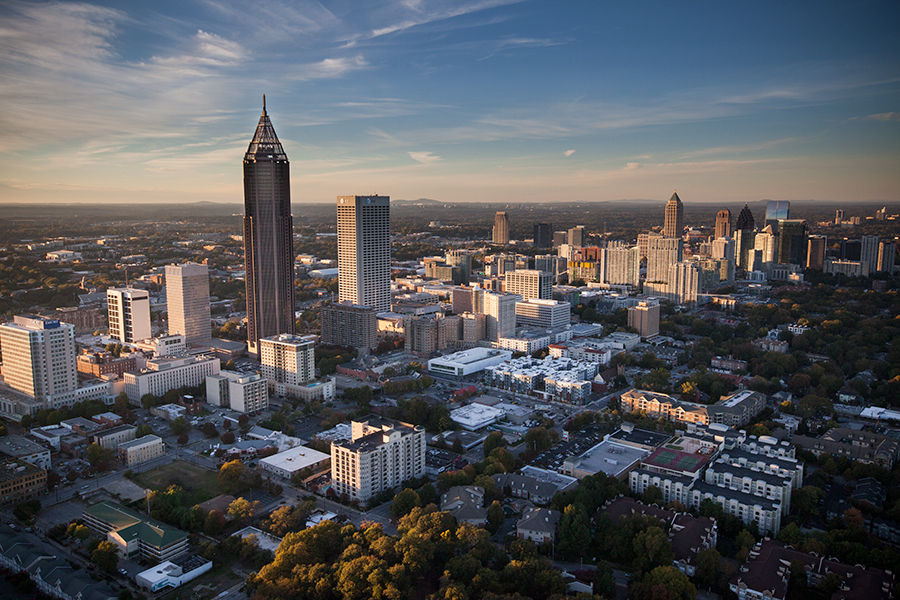City of Atlanta Recognizes ‘Top Performing’ Midtown Buildings for Energy, Water Savings

The City of Atlanta Mayor’s Office of Resilience recently honored top buildings and leaders committed to energy and water conservation through the Atlanta Better Buildings Challenge (ABBC), the City’s nation-leading public-private sustainability initiative. Through the program, commercial buildings aim to reduce energy and water consumption by at least 20 percent by 2020.
In 2016, 26 buildings within the Midtown Core participated in the ABBC, representing over 12M SF of commercial and residential building space. Midtown properties rose to the occasion, ranking among top performing buildings throughout Atlanta by achieving the highest levels of energy and water savings in 2016. Properties participating in this initiative include:
-
100 Colony Square
-
1100 Spring Street
-
1180 Peachtree
-
400 Colony Square
-
Emory University Hospital Midtown-Summit Parking Deck
-
Federal Reserve Bank of Atlanta
-
Georgia Institute of Technology-Allen Lamar Sustainable Education Building
-
Georgia Institute of Technology-Technology Square Research Building
-
One Atlantic Center
-
One Midtown Plaza
-
Promenade
-
Ten 10th Street
-
Ten Peachtree Place
-
Two Midtown Plaza
-
WSB-TV
-
The Lutheran Church of the Redeemer
“Midtown’s participation in the Atlanta Better Buildings Challenge has far exceeded our initial goal of committing 10 million square feet of commercial space,” said Mark Noll, Transportation and Sustainability Project Manager for Midtown Alliance. “We look forward to growing this success as Midtown becomes one of the most dynamic, innovative, and environmentally sustainable communities in the nation.”
Atlanta Better Buildings Challenge Recognized as Best-in-Class Nationally
Launched in 2011, the ABBC – a partnership between the City of Atlanta, Midtown Alliance, Central Atlanta Progress, Livable Buckhead and Southface – supports the U.S. Department of Energy’s goal of helping businesses save nearly $40B annually in energy costs. So far, the city-wide program remains ahead of the game. According to the ABBC 2016 Annual Report:
-
Atlanta currently leads the nation with a combined 114M+ square feet of buildings participating in the program – with total participating space equal to 100 One Atlantic Center towers;
-
80+ buildings in the city have met the 20% water savings goal with 161 buildings meeting their 20% energy reduction goal ahead of the 2020 deadline; and
-
11,833 tons of CO2 have been eliminated from the air we all breathe since 2011 – the equivalent weight of a fleet of 340 fully-loaded dump trucks; and
Earlier this year, ABBC was hailed as a best in class program by the U.S. Environmental Protection Agency, receiving the 2017 Climate Leadership Award-Innovative Partnership Certificate. Through the award, the U.S. EPA recognized its exceptional achievements and partnerships with organizations like Midtown Alliance to provide a direct conduit to owners of participating commercial property owners.
“This program plays a pivotal role in furthering Atlanta as a top-tier city for sustainability,” said Atlanta Mayor Kasim Reed. “Participants are saving money on bills now, while helping to ensure a more resilient future for all Atlantans.”
With only 3 years to go until the 2020 target is met, more ABBC success stories are sure to follow. The City and its partners are gearing up for the program’s second phase, which will also include a focus on waste and material management as well as public health.
Take the Challenge
Learn how your building can participate in the Atlanta Better Buildings Challenge at AtlantaBBC.com




